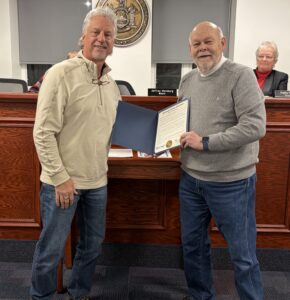Day highlights importance of preserving bees, other pollinators

Members of the Chautauqua County Beekeepers Association Inc. pictured, from left, are Rod Shoup, Laura LaMonica and Melissa Himes. Sunday was recognized as World Bee Day to help preserve bees and other pollinators.
ELLICOTT — From the approximately 50 members of the Chautauqua County Beekeepers Association Inc. to the world at large, people are rejoicing in the shared appreciation of bees and other pollinators that make many food products from crops to honey possible for consumers.
Last year, the United Nations General Assembly proclaimed that World Bee Day to be celebrated May 20. It is the hope that the public at large will focus their attention on preserving honey bees and other pollinators and understand the importance of such creatures.
Locally, members of the Beekeepers Association take their volunteer hobby very seriously in taking care of an apiary, a collection of artificial beehives behind Ring Precision Components near the Jamestown Airport. They also exist to educate new members who might be interested in preserving honey bees of their own.
“This is not necessarily a day for bees; it’s a day for pollinators,” said Dennis LaMonica, president of the association.
As he and his wife Laura along with other members of the association take care of their apiary, they warn that it’s not just honey bees who are losing their environment due to the way roads and buildings are constructed, lessening the foraging area for honey bees. In fact, Dennis LaMonica says that honey bees are in far less danger than other pollinators.
“Even though (honey bees) are the poster child, they’re not in danger,” he said.
With a reminder that other pollinators such as bumble bees, moths and other insects are in danger more so than honey bees, members Dennis, Laura, Rod Shoup and Melissa Himes looked toward the future of the next celebration: National Pollinator Week from June 18-24.
Supported by the Cornell Cooperative Extension and recently State Sen. Cathy Young, who incorporated the association into the New York State budget one time, the members are focused on what they can do to help out locally.
The honey bee improvement process is focused on sustainability, meaning the association shoots for local beekeepers to understand that it’s best for the bee populations and the beekeepers to raise bees locally instead of purchasing them from more summery locations like Georgia.
“All of (the practices) are aimed at the survivorship of bees locally,” Laura said.
Bees have been raised since 6,000 BC Dennis LaMonica said. Bees were transferred down the Nile River by the Egyptians, and since 1870, the Chautauqua County Beekeepers Association has been producing roughly around the same amount of honey throughout its century-plus tenure.
“Beekeepers have been keeping bees in Chautauqua County for a long time,” Laura LaMonica said.
Dennis and Laura LaMonica, and the others, demonstrated the proper handling of bees in their artificial hives. Smoke is used to mask the pheromones that cause honey bees, which are comparably tame to some other pollinators, to want to gang up and sting.
Beekeepers then reveal the supers that are stacked onto each other to keep the bees together. They take out flat frames onto which the bees create their colonies. Honey production, nesting and all other bees work happens in this confined space with thousands of honey bees scurrying around.
Honey bees are important because of the monocultures, or single-crop fields, they can effectively pollinate. These can include almonds, blueberries and watermelons.
Those who want to learn more can request to join the Chautauqua County Beekeepers Association public group on Facebook. Meetings are held at the Frank W. Bratt Agricultural Center on the first Thursdays of every month from 7-9 p.m.





